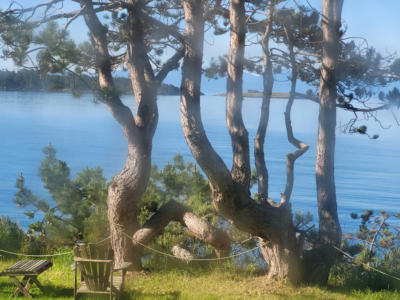
I am watching the final day of our vacation begin. The sun illuminates the eastern sides of the tree trunks as if the trees and the sun are conversing. The bay is serene, the water so unrippled it betrays nothing of the activity beneath: the fish, the seals, the otters, the kelp. By midday there will be more commotion out there, some wind perhaps, more animals making themselves visible. I will don my wet suit to take my daily ocean dip. At twilight the lengthening sun rays will paint the lawn and sky orange and gold and pink and purple, and we will pause in our dinner preparations to express awe again and take deeper breaths. It is hard to leave this place.
When I was living in New York I was briefly in psychoanalysis with an analyst in training. Weeks went by—maybe months—as I lay on his couch and babbled on about my life, sure I was being trivial, as the analyst sat in stony silence, certainly bored, I thought. One day, seemingly out of the blue, he spoke. “You have trouble with endings,” he said. It brought me up short. Did I have trouble with endings? It had never occurred to me. In the intervening years I have mulled this question over and over.
Beginnings are easy to love. The birth of a baby whose presence delights family and friends. Weddings with their ceremonial beauty, especially when the couple is visibly in love. Bar mitzvahs marking the beginning of maturity. Even book launches are happy occasions, when everyone has high hopes for the long life of the book. How can one not love the unadulterated optimism that accompanies such beginnings?
Endings are more fraught. The death of a spouse, a child, a parent, a friend. The end of a marriage or relationship. The end of good health, good luck. Evictions, bankruptcies, the loss of reputations.
And yet there are other kinds of endings too. The proud moments of a project wrapped up, an expedition completed, a graduation. The moments of relief occasioned by the end of a harrowing job interview, a difficult exam, a cycle of chemotherapy. The end of a heat wave, a hurricane, a wild fire vanquished.
I understand that I’ve been thinking about endings in a limited way, the inheritance of a culture that favors labeling and binary thinking. Fire or ice? Cats or dogs? Vanilla or chocolate? Sunrise or sunset? We love to mark endings with hard lines and dates, but most endings—with the exception of sudden death—are not abrupt, but gradual, signaled in advance with signs of their imminent arrival. A relationship begins to run amuck before the divorce happens. A student’s prowess is on display before she graduates. A day begins to dim before it ends altogether. Endings, whether “good” or “bad” are transitions to something different, something almost always embedded in what went before. We carry threads of the former into the latter. Memories. Habits. Friends. I imagine my own ending this way: One day I’ll morph into a cluster of atoms seeking a new place to reside.
What I’m saying feels self-evident, but it’s something I need to remind myself as this vacation comes to a close. I need to remember the “new” life that awaits for me at home—a new life growing from the old one, of course. It will include book promotion activities, a documentary someone will be shooting about me, eye surgery to clear my vision, more writing. What is not to like?! Certainly these things are worth ending a vacation for.
So maybe it’s true, Dr. Butler, maybe I do have trouble with the transitions we call endings. But I promise you, decades later I’m still working on it.
Add Comment